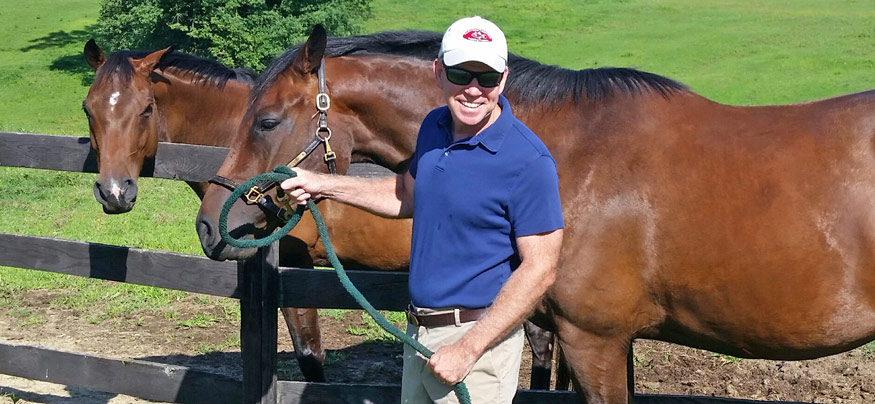Chris Runde (DVM ’85): Maryland veterinarian advances the profession through legislative efforts
Written by Lynn Young
July 1, 2015

When most veterinarians read about the Veterinary Practice Act, they are completing a licensing requirement on their road to enter private practice. Rarely do they take a second look. Dr. Chris Runde (DVM ’85) felt the same way until his 30-year professional journey took a detour into the world of regulatory medicine.
Veterinary law and its application are now an important part of Runde’s professional life as president of the Maryland State Board of Veterinary Medical Examiners and a board of directors member for the American Association of Veterinary State Boards.
From a young age, Runde knew that he wanted to be a veterinarian. He grew up in a small town in Wisconsin, but preferred his uncle’s dairy farm to town life. When Runde was 13, he and his family moved to Maryland. He excelled at science in high school, loved his pet Brittany spaniel, and was interested in wildlife, birdwatching, and fishing. At 19, Runde began working with Dr. Cyril Heinrich in Berlin, Maryland, as a veterinary assistant and kennel worker. He also had a job working in the stables at Ocean Downs, a local standardbred track.
Runde graduated from the University of Maryland with a bachelor’s degree in agriculture in 1981 and from the Virginia-Maryland College of Veterinary Medicine with his doctor of veterinary medicine degree in 1985.
“One of our favorite professors in school was Dr. Fred Troutt, who later worked at the University of Illinois,” he said. “He told us several times to ‘taste it all,’ and I have tried to do that. I am comfortable doing everything from GDV surgeries in foxhounds to pre-purchase exams in very expensive horses and now testifying about pending legislation before a Senate subcommittee.”
While in veterinary school, he went to Kentucky and worked with 22 veterinarians at Hagyard-Davidson-McGee, a practice largely specializing in equine reproduction in thoroughbred horses. After graduation he took a position with Squire Veterinary Clinic in Upper Marlboro, Maryland. He worked under Dr. John Hayes at this mixed practice until 1987 when he and Dr. Mike Parks (DVM ’84) purchased Tidewater Veterinary Hospital in St. Mary’s County, Maryland. This mixed practice has grown into a thriving hospital with six veterinarians. In addition to Runde and Parks, Tidewater Veterinary Hospital employs two other veterinary college alumni: Dr. Chas Benedict (DVM ’94) and Dr. Rania Lisas (DVM ’00).
Today, Runde continues his veterinary responsibilities at the hospital and has served the profession through a number of leadership roles. He lives near his practice on 50 acres, where he currently keeps four horses. Wife Karen trains the horses, he noted. Their children, Kristina and Brendan, have both pursued careers in the biological sciences.
In 2003, Runde was appointed by Gov. Robert Ehrlich to the Maryland State Board of Veterinary Medical Examiners, which seeks to protect the public and to ensure that the standard of care is upheld. He was first elected board president in 2004 and held this position for a record-breaking 10 years. This gave Runde a taste of another side of veterinary medicine involving government, politics, and an opportunity to make a difference for his fellow practitioners and the public.
As board president, Runde was able to help make changes in the Veterinary Practice Act through the introduction of bills to the Maryland legislature. He even appeared in front of various committees to testify about the legislation. In 2007, the board introduced a bill that changed the Veterinary Practice Act to allow fourth-year veterinary students who were preceptors at Maryland veterinary practices to legally perform surgeries such as spays and neuters under the supervision of a licensed veterinarian. Prior to the bill’s passage, this practice was illegal, presenting a serious obstacle to a quality preceptor experience.
In 2010, the American Association of Veterinary State Boards (AAVSB) asked Runde to open its annual conference in Baltimore with a “Welcome to Maryland” presentation. This began his involvement with the nonprofit organization which provides continuing education, administers the Veterinary Technician National Exam, and provides access to central databases for state boards. Runde has served on the AAVSB’s board of directors since 2014.
Throughout his career, Runde has enjoyed his “extracurricular” activities, especially when it involves the regulatory aspects of veterinary medicine. He also works with the Maryland Veterinary Medical Association’s Maryland Veterinary Foundation and has been giving back to his alma mater by serving on the Virginia-Maryland College of Veterinary Medicine’s Curriculum and Admissions Advisory Board.
By working with other veterinarians on the local and national level and networking with veterinary associations such as the American Veterinary Medical Association, Runde has been able to make a difference in the profession and improve the lives of practitioners nationwide.
Written by Lynn Young





